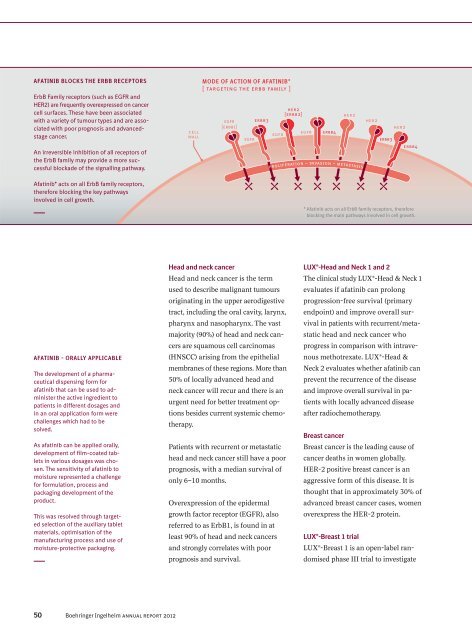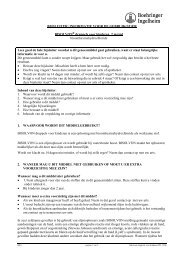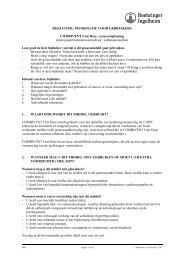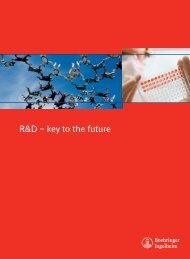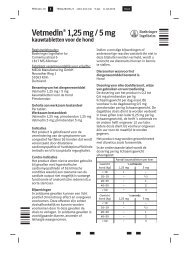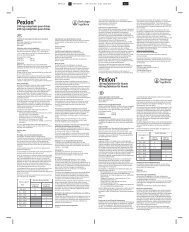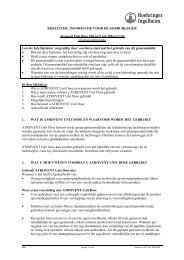Corporate Magazine 2012 - Boehringer Ingelheim
Corporate Magazine 2012 - Boehringer Ingelheim
Corporate Magazine 2012 - Boehringer Ingelheim
Create successful ePaper yourself
Turn your PDF publications into a flip-book with our unique Google optimized e-Paper software.
AFATINIB BLOCKS THE ERBB RECEPTORSErbB Family receptors (such as EGFR andHER2) are frequently overexpressed on cancercell surfaces. These have been associatedwith a variety of tumour types and are associatedwith poor prognosis and advancedstagecancer.An irreversible inhibition of all receptors ofthe ErbB family may provide a more successfulblockade of the signalling pathway.cellwallMODE OF ACTION OF AFATINIB*[ targeting the erbb family ]egfr[erbb1]egfrerbb3egfrher2[erbb2]egfrerbb4her2proliferation – invasion – metastasisher2erbb3her2erbb4Afatinib* acts on all ErbB family receptors,therefore blocking the key pathwaysinvolved in cell growth.* Afatinib acts on all ErbB family receptors, thereforeblocking the main pathways involved in cell growth.AFATINIB – ORALLY APPLICABLEThe development of a pharmaceuticaldispensing form forafatinib that can be used to administerthe active ingredient topatients in different dosages andin an oral application form werechallenges which had to besolved.As afatinib can be applied orally,development of film-coated tabletsin various dosages was chosen.The sensitivity of afatinib tomoisture represented a challengefor formulation, process andpackaging development of theproduct.This was resolved through targetedselection of the auxiliary tabletmaterials, optimisation of themanufacturing process and use ofmoisture-protective packaging.Head and neck cancerHead and neck cancer is the termused to describe malignant tumoursoriginating in the upper aerodigestivetract, including the oral cavity, larynx,pharynx and nasopharynx. The vastmajority (90%) of head and neck cancersare squamous cell carcinomas(HNSCC) arising from the epithelialmembranes of these regions. More than50% of locally advanced head andneck cancer will recur and there is anurgent need for better treatment optionsbesides current systemic chemotherapy.Patients with recurrent or metastatichead and neck cancer still have a poorprognosis, with a median survival ofonly 6–10 months.Overexpression of the epidermalgrowth factor receptor (EGFR), alsoreferred to as ErbB1, is found in atleast 90% of head and neck cancersand strongly correlates with poorprognosis and survival.LUX®-Head and Neck 1 and 2The clinical study LUX®-Head & Neck 1evaluates if afatinib can prolongprogression-free survival (primaryendpoint) and improve overall survivalin patients with recurrent/metastatichead and neck cancer whoprogress in comparison with intravenousmethotrexate. LUX®-Head &Neck 2 evaluates whether afatinib canprevent the recurrence of the diseaseand improve overall survival in patientswith locally advanced diseaseafter radiochemotherapy.Breast cancerBreast cancer is the leading cause ofcancer deaths in women globally.HER-2 positive breast cancer is anaggressive form of this disease. It isthought that in approximately 30% ofadvanced breast cancer cases, womenoverexpress the HER-2 protein.LUX®-Breast 1 trialLUX®-Breast 1 is an open-label randomisedphase III trial to investigate50 <strong>Boehringer</strong> <strong>Ingelheim</strong> annual report <strong>2012</strong>


